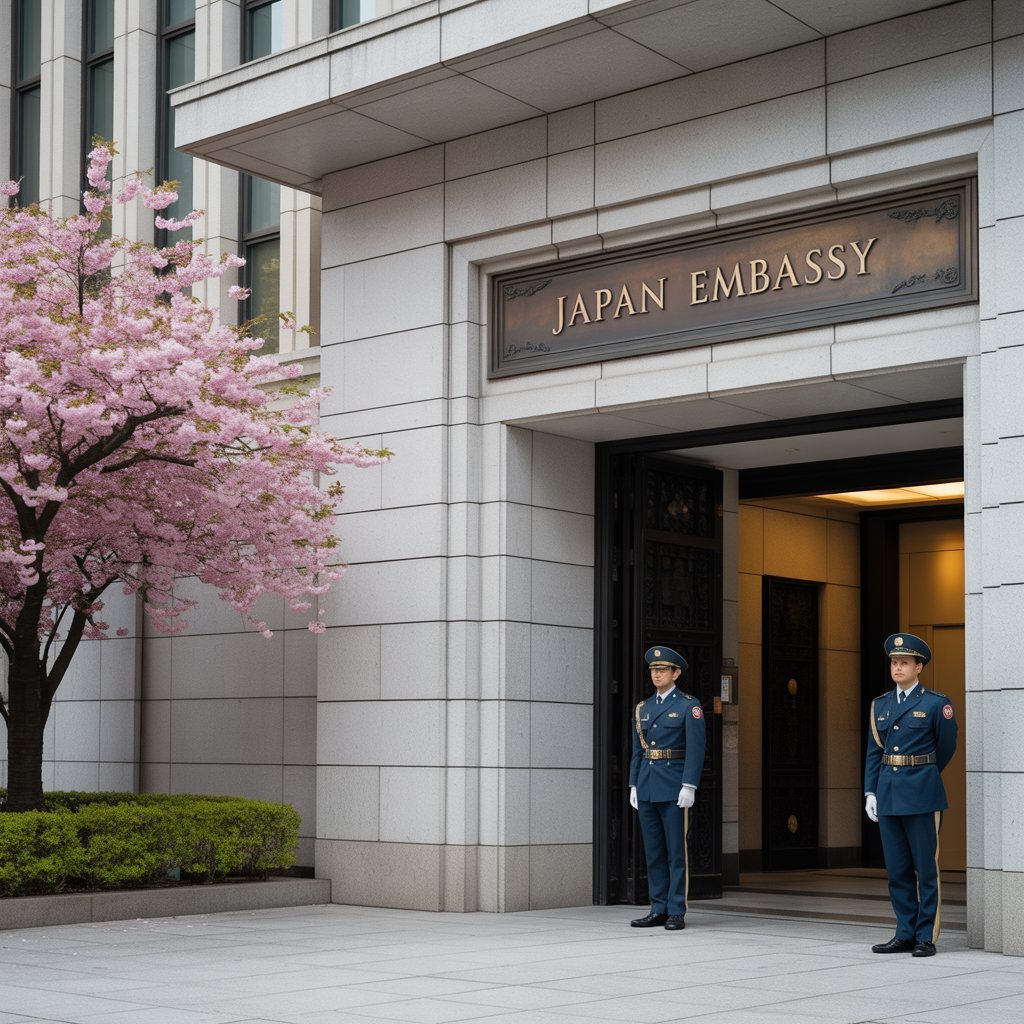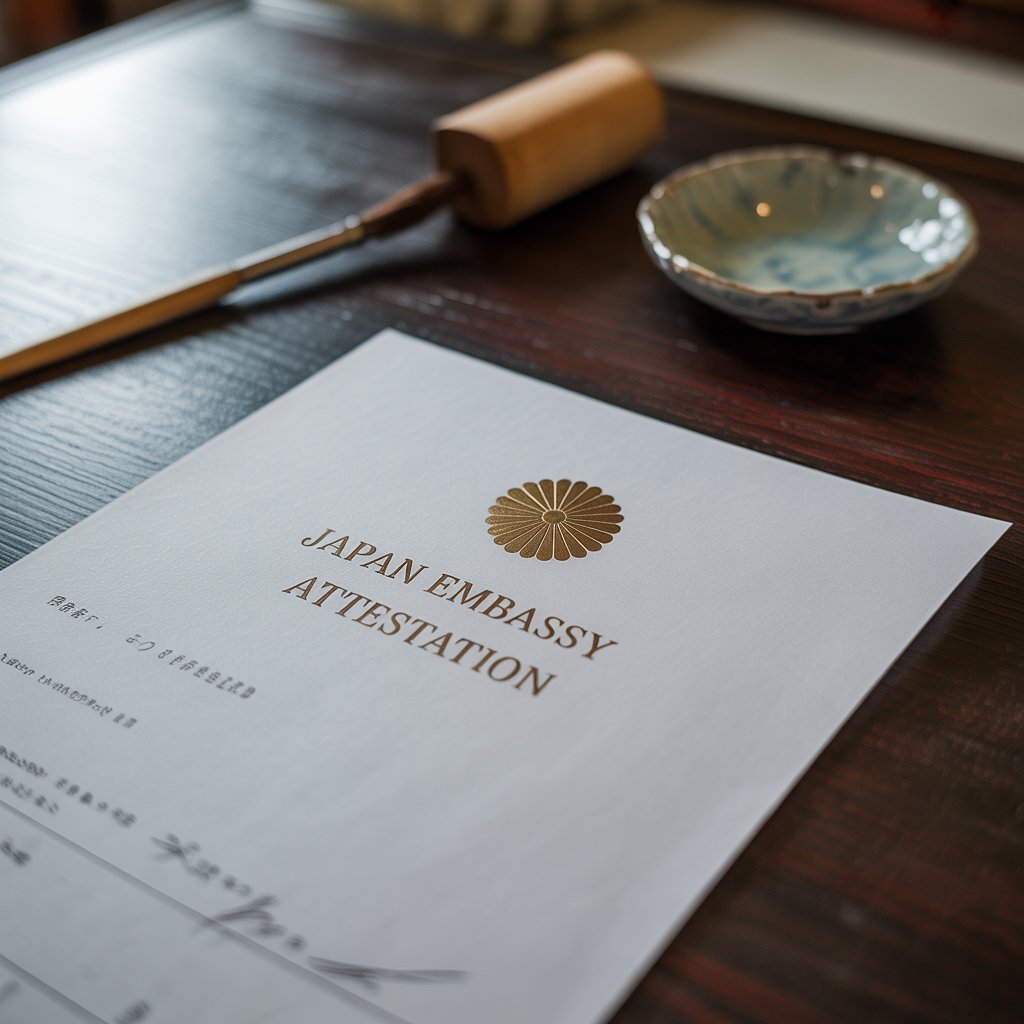In today’s globally connected world, the process of legalizing personal and corporate documents for international use is essential. Among the many legal formalities, Japan Embassy Attestation stands as a pivotal requirement for those intending to use Indian-origin documents in Japan. Whether you’re planning to study, work, settle, or establish business ties with Japan, getting your documents attested through the Japan Embassy ensures they are recognized and accepted by relevant Japanese authorities.
In this blog, we will walk you through every aspect of Japan Embassy Attestation, covering procedural steps, the role of regional affidavits, notaries, state issuance, and the key cities where services are sought most often. We will blend clear bullet points and engaging narrative for a seamless learning experience. Let’s get started.

What Is Japan Embassy Attestation?
Japan Embassy Attestation refers to the process of authenticating Indian-origin documents—such as educational certificates, marriage certificates, birth certificates, commercial documents, and more—so that they are legally valid in Japan. The attestation process typically includes:
- Notarial certification
- Home-state human rights office/legal department attestation
- Ministry of External Affairs (MEA) apostille (or attestation)
- Final attestation at the Consular Section of the Embassy of Japan in India
The primary objective behind Japan Embassy Attestation is to confirm the authenticity of signatures and seals, so Japanese authorities can rely upon them. It’s widely needed for immigration (visa applications), corporate registration, academic admission, licensing, and employment purposes.
Key Documents That Require Japan Embassy Attestation
Here’s a quick overview of commonly attested documents:
- Educational credentials (e.g., degrees, diplomas, transcripts)
- Commercial papers (e.g., invoices, certificates of incorporation, POA)
- Personal documents (e.g., marriage certificates, birth certificates, affidavit of support)
- Legal documents (e.g., Power of Attorney, divorce decrees)
- Background verification documents (e.g., Police Clearance Certificate)
Each of these documents must follow the Japan Embassy Attestation chain. The progression—from notary to home-state attestation, to MEA, and finally to the Embassy of Japan—ensures the documents are duly legal and internationally recognized.
Why Is Japan Embassy Attestation Important?
- Legal Validity in Japan
With Japan Embassy Attestation, Indian documents become legally valid in Japan. Without this process, Japanese authorities will generally reject documents not properly authenticated. - Avoidance of Delays
Proper, complete Japan Embassy Attestation streamlines document submission, eliminating unexpected delays in visa processing, university admissions, or corporate proceedings. - Prevents Rejection
Incomplete or improperly attested documents can lead to outright rejection. Ensuring every stage of the Japan Embassy Attestation is followed mitigates the risk. - Global Standard Compliance
The Japan Embassy Attestation procedure reflects international best practices for cross-border document acceptance. It affirms that India-Japan document exchange meets required legal standards.
Step-by-Step Japan Embassy Attestation Process
Below is a structured breakdown of the typical Japan Embassy Attestation workflow:
- Notarial Attestation
- Documents are first notarized by a certified notary public.
- Notaries verify the authenticity of the document and the identity of signatories.
- Home-State or Regional Attestation
- Following notarization, documents proceed to the Home Department, Human Rights Office, or State Education Department for attestation.
- This step validates that the notary is legitimate and the document originates within the Indian legal framework.
- MEA Apostille or Attestation
- The Ministry of External Affairs (MEA) either apostilles or attests the document.
- This crucial step confirms the document for international use and is a mid-point in the Japan Embassy Attestation chain.
- Japan Embassy Attestation
- Lastly, the attested document is submitted to the Consular Section of the Embassy of Japan for final attestation.
- This seals the entire process under the jurisdiction of Japanese authorities.
Each step must be completed sequentially—skipping or mis ordering them can invalidate the Japan Embassy Attestation process.
Popular Indian Cities Where Japan Embassy Attestation Is Frequently Used
1. New Delhi
As the national capital and host to the Embassy of Japan, New Delhi is a primary hub for Japan Embassy Attestation processes. Many applicants from across India either travel to Delhi or use regional facilitation services. Agencies here specialize in guiding citizens through all phases—from notary to home-state authentication, MEA processing, and final Embassy attestation.
2. Mumbai
Mumbai serves as a major commercial and educational gateway. Students heading to study in Japan from Mumbai frequently require Japan Embassy Attestation for their academic documents and police clearances. The city’s legal and courier infrastructure supports efficient document processing.
3. Chennai
Chennai is an academic and cultural epicenter in South India. Aspirants seeking admission to Japanese institutions or employment often rely on Chennai-based agencies to complete the full Japan Embassy Attestation itinerary.
4. Kolkata
With rising interest in Japan-related cultural exchange and business, Kolkata sees many individuals seeking Japan Embassy Attestation for personal and corporate documents. Local legal offices and translation providers help ensure smooth attestation workflows.
5. Bangalore
Known for its tech talent and innovation, Bangalore’s professionals frequently opt for Japan Embassy Attestation when pursuing opportunities in Japanese companies or collaborations. The city’s corporate infrastructure streamlines document preparation and certification.
A Closer Look: Japan Embassy Attestation from Delhi
New Delhi, being home to the Embassy of Japan in India, plays a pivotal role in facilitating Japan Embassy Attestation. Let’s explore what makes Delhi central to this process:
- Proximity to the Embassy: The Embassy of Japan is located in New Delhi, making it the final point of submission for documents requiring Japan Embassy Attestation.
- Specialized Legal Services: Numerous legal agencies in Delhi specialize in navigating the complex chain of notary, home-state attestation, MEA authentication, and final attestation by the Japanese Embassy.
- Customs and Logistics: Delhi-based providers are adept at both document consolidation and secure delivery—especially for applicants sending completed documents back to other cities after attestation.
- Expert Guidance: From form filling to document formatting, Delhi’s agencies excel at ensuring the Japan Embassy Attestation submission package meets all procedural and technical requirements.
If you’re in New Delhi, utilizing local Japan Embassy Attestation services can dramatically reduce turnaround time and error risk, ensuring your documents are embassy-ready.
Detailed Compliance Checklist for Japan Embassy Attestation
To guarantee a smooth Japan Embassy Attestation journey, here’s a compliance checklist:
- Ensure document copies are clear and legible—originals may require notary certification of copies.
- Confirm that certificates (like birth or marriage) are obtained from the appropriate issuing authority (e.g., municipal corporation, registrar).
- For academic documents (degrees, transcripts), ensure they bear proper seals and signatures from college/university officials.
- Affidavits must be properly typed, signed, and notarized.
- When preparing commercial documents (e.g., Certificates of Incorporation, Invoices), verify that they feature company letterheads and official seals.
- Submit documents in physical form—digital scans or emails are usually not accepted for Japan Embassy Attestation.
- If translations are needed (e.g., regional language to English), get them notarized and include alongside the original documents.
- Track each step—note the date and reference number after every stage of attestation.
Advantages of Using a Specialized Agent or Service for Japan Embassy Attestation
- Expert Navigation: Agents understand the nuances of each attestation step, especially when regional offices have unique protocols.
- Time Efficiency: They help consolidate and courier documents between notary, state departments, MEA, and the Embassy.
- Error Minimization: Agencies pre-check for formatting, signatures, seals—reducing chances of document rejection.
- Convenience: Particularly helpful for applicants living outside Delhi who need documents delivered to the Embassy.
- Updates and Alerts: Reputable services notify you when each attestation stage is completed.

We Providing various states of Apostille Services
southern india
Northern india
Western India
Eastern India
Common Pitfalls in Japan Embassy Attestation – And How to Avoid Them
- Skipping a Step: Never skip from notary directly to MEA; regional attestation is mandatory for Japan Embassy Attestation.
- Poor Formatting: Documents without clear seals, light printing, or missing issuance dates may be rejected.
- Wrong Submission Details: Addressing documents to the wrong consular section or omitting applicant details can delay processing.
- Unsuitable Translations: Non-notarized translations or those lacking translator credentials may not be accepted.
- Not Tracking: Without tracking or reference numbers, documents can get misplaced during transit between departments.
By staying proactive and attentive, you can avoid these roadblocks and ensure the Japan Embassy Attestation is completed smoothly.
Real-Life Scenario
Imagine Radha, a software engineer from Bangalore, has secured a job with a Tokyo-based firm. She needs to get her degree certificate, birth certificate, and police clearance attested for her work visa.
- First, she notarizes copies of her documents with a local notary.
- Next, she submits those documents to the Karnataka Home Department for regional attestation.
- Once satisfied, she sends the attested papers to MEA in Delhi for apostille.
- When MEA completes the apostille, she forwards them to the Embassy of Japan in New Delhi for final Japan Embassy Attestation.
- In the end, Radha receives her documents, now fully attested and ready for her visa application.
This example underscores how essential each step is in the Japan Embassy Attestation chain.
Summary
Japan Embassy Attestation is a vital process that bridges Indian-origin documents to legal acceptability in Japan. It involves coordinated steps through notary, regional attestation, MEA, and finally, the Embassy of Japan. Cities like New Delhi, Mumbai, Chennai, Kolkata, and Bangalore play outsized roles in facilitating this attestation journey.
Understanding the procedure—and optionally partnering with trusted agents—helps avoid common pitfalls, cut delays, and ensure seamless recognition of your declarations in Japan. Whether for education, employment, corporate expansion, or family-related needs, Japan Embassy Attestation paves the way for international opportunities without legal friction.
FAQs: Japan Embassy Attestation
Q1. What is Japan Embassy Attestation?
A: It is the final authorization by the consular section of the Embassy of Japan verifying Indian-origin documents for use in Japan.
Q2. Which documents require Japan Embassy Attestation?
A: Common documents include educational credentials, personal certificates (birth, marriage), affidavits, police clearance, commercial papers, and legal instruments.
Q3. What are the steps involved in Japan Embassy Attestation?
A: Notary → Regional/state attestation → MEA apostille/attestation → Embassy of Japan attestation.
Q4. Can I complete Japan Embassy Attestation remotely?
A: While you can use courier or agent services, final submission to the Embassy must follow official protocols and paperwork. Services can help manage logistics.
Q5. Do all Indian states follow the same procedures?
A: The core sequence is consistent, but regional nuances (e.g., office naming, documentation, fees) may vary. Use a reputable local agent to avoid surprises.
Q6. What happens if a document is rejected by the Embassy of Japan?
A: You’ll be informed of the rejection reason. You’ll then need to correct the issue, re-process at the earlier stage, and resubmit.
Q7. How long does Japan Embassy Attestation take?
A: Timelines vary by location and document type. Processing may range from a few days to a few weeks. Using professional assistance often speeds things up.
Q8. Do translations need attestation too?
A: Yes—translations must typically be notarized and, if needed, included in the Japan Embassy Attestation chain alongside the original documents.
Q9. Can commercial invoices and certificates be attested?
A: Definitely. Any document intended for official use in Japan—like invoices, certificates of incorporation, or POAs—needs full Japan Embassy Attestation.
Q10. Must I appear at the Embassy of Japan in person for final attestation?
A: In many cases, professional agencies can submit on your behalf via courier or authorized personnel. Confirm current practices with your service provider.
